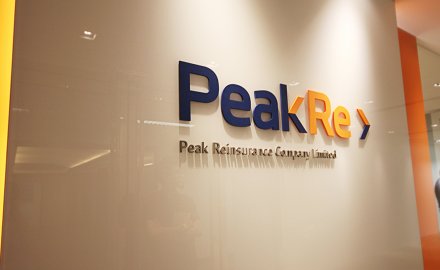Peak Re hybrid raising adds Asia firepower as prices harden
November 4 2020 by Nick Ferguson
Peak Re’s latest round of new capital will help the Hong Kong-based reinsurer take advantage of pricing conditions, says chief executive Franz Josef Hahn.
The US$250 million issuance of hybrid securities provides the company with an independent source of capital that will receive partial equity credit from rating agency Moody’s and broadens the company’s funding base.
“The key issue for us was really to get additional firepower into Peak Re from a diversified source,” Hahn told InsuranceAsia News. “The hardening of pricing is a process which has just started, so we wanted to make sure that we have sufficient power to dial up what we are underwriting already.”
Most of those opportunities will continue to be in Asia, which contributed 68% of the company’s gross written premiums last year, though Peak Re has also been growing strongly in the US and Europe. Hahn is forecasting a slight shift in balance towards those markets this year.
“We are in the business of putting capital to risk,” he says. “Wherever we can do it at better terms, we will do it — and that’s what we owe to our investors and to the future of the company.”
Diversification
This expansion into developed markets has mostly come through the company’s subsidiary in Switzerland and the acquisition of a fund manager in Bermuda, now known as Peak Capital, which specialises in ILS.
Peak Re’s expanding product and geographic diversification was noted as a strength in Moody’s rating of the securities, alongside its good franchise in the Asian reinsurance market and solid capitalisation.
“Emerging Asia has more proportional business and you really need to know the market environment in detail.” Franz Josef Hahn, Peak Re
However, the rating agency also noted that some of these strengths are offset by low profitability compared to more established global peers and “the constraint on its financial flexibility from the weak credit profile of its major shareholder Fosun”.
Using the capital provided through the new offering for further diversification will be credit positive. It’s typically easier to deploy capital opportunistically in developed markets, whereas in emerging Asia the risk being placed to reinsurers is often more challenging to participate in.
“Emerging Asia has more proportional business,” says Hahn. “So you really need to know the market environment in detail and you need to know the client in detail because you proportionally participate in each and every business which they are underwriting.”
At the same time, Peak Re has strong local knowledge and favourable pricing movements could certainly see it using its new capital to pursue opportunities in Asia.
Hybrid structure
Peak Re is now in its eighth year — an age at which its main shareholder, Fosun might expect to see the company go public.
However 2020 has been a challenging year for the (re)insurance market and isn’t the ideal time to be considering a costly and time-consuming initial public offering (although the Hong Kong stock market has been surprisingly busy this year, thanks mostly to the interest in tech companies).
Priced with a coupon of 5.35%, the deal attracted US$1.1 billion of orders from a high-quality book of global investors.
A perpetual bond offers Peak Re some of the advantages of equity. It is deeply subordinated and ranks at the bottom of the capital structure just above common equity. The coupon repayments have an optional deferral mechanism and there is (obviously) no maturity date — all of which offers some accounting benefits over straight debt and will allow the company to stay private.
The window for perpetual issuance isn’t always open and the opportunity to issue such hybrid bonds tends to depend on the right market conditions. With equity volatility still at high levels and interest rates at ultra-low levels, the chance to receive a stable yield from a high-quality name like Peak Re was clearly attractive to investors.
Priced with a coupon of 5.35%, the deal attracted US$1.1 billion of orders from a high-quality book of global investors.
“We have been thinking about issuing a hybrid for the last couple of years and this year seemed to be the right timing,” says Hahn. “There was a lot of top investor interest, very nicely diversified on a global basis.”
Now it is in the hands of Peak Re to make sure the investment is worthwhile.
-
Qantas cyber breach to create turbulence for insureds and insurers, but losses could fly under the radar
- July 4
AIG-led cyber program placed by Marsh is unlikely to be significantly hit, industry sources told InsuranceAsia News.
-
Regional risk concerns for ‘fourth utility’ as data centres seek answers to perils threat
- July 3
Threat of cyber attack or system failure has been a focus for risk management systems, but physical risks, such as natural disasters, power failures and physical security risks, are often less understood.
-
‘Reinsurers have been quite clear that they’re still looking to grow’: Gallagher Re’s Heather Bone
- July 2
At the July 1 renewals, while supply was abundant, demand is falling given increasing consolidation in Australia’s insurance industry.
-
Nuclear fusion is the next frontier for insurers, but collaboration essential amid sustainable energy push
- July 1
China, alongside the UK, US, and Germany, are the leading nations in the global drive to create fusion power.
-
Allianz General | Allianz General combines innovative protection solutions while powering social good to lead Malaysian market
The insurer proactively addresses emerging risks and evolving customer protection needs while giving back to the community.
-
Sedgwick | Asia’s Energy Transformation – Balancing Growth, Risk and Renewables
Energy market presents unique risks, especially in a region which includes China and Japan as well as developing nations like Vietnam and the Philippines.
-
Beazley | Turbulent Waters: the maritime energy transition challenge
Businesses are facing a complex transition to non-carbon energy sources amid a push to achieve net-zero emissions for the marine sector by 2050.
-
Aon | Navigating shifts in the global and Asia insurance markets
Neelay Patel, Aon head of growth for Asia, says the market in Asia is at an ‘interesting stage of the cycle’.

